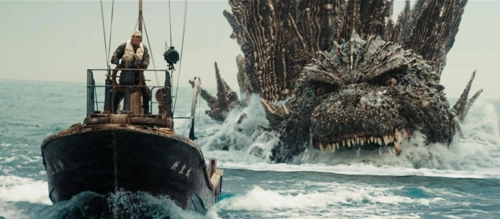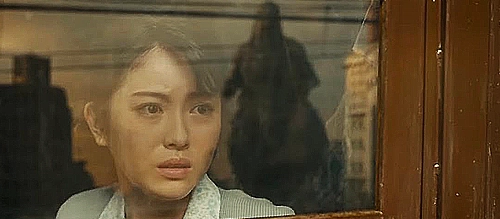Godzilla Minus One (2023) Review

Godzilla Minus One / Gojira -1.0 (2023)
Director: Takashi Yamazaki
Screenwriter: Takashi Yamazaki
Starring: Ryunosuke Kamiki, Minami Hamabe, Yuki Yamada, Munetaka Aoki, Hidetaka Yoshioka, Sakura Ando, Kuranosuke Sasaki, Mio Tanaka, Sae Nagatani
As visually polished and park-your-brain-at-the-door fun as the Hollywood Godzilla films are, they aren’t exactly overflowing with big ideas or thematic subtext. That’s what the Japanese Toho movies are for. Now, with their most famous character in a shared custody arrangement with Legendary Pictures that currently allows them to unleash a new Gojira film only in years that don’t include a competing US Monsterverse release, they’ve come out of the gate in 2023 with an absolute barnstormer.
In the final months of World War II, Koichi Shikishima (Ryunosuke Kamiki), a kamikaze pilot deserter, witnesses the massacre of an engineering crew by an ancient dinosaur-like monster. As he returns to life in a bombed-out Tokyo recovering from the US Pacific Campaign, he gains a new family in Noriko (Minami Hamabe) and an adopted little girl. Soon the creature reappears, now mutated to a colossal size by radiation from nuclear weapons testing, and begins a new path of destruction across a country still in turmoil.
Refreshingly for a kaiju monster movie, the human element is at the forefront of the filmmakers’ minds and, as evidenced by movies ranging from Jaws to Independence Day, it pays dividends to spend so much time on character development early on so you actually care when their world starts going to hell. The film highlights an unconventional family unit made up of unmarried domestic partners and an unrelated child rescued from the streets, which seems a little anachronistic at first (and Koichi’s domestic setup does give his colleagues pause the first time they visit him at home) but there must have been so many similar relationships formed out of necessity in the immediate aftermath of a costly war. This group of protagonists including military personnel, scientists and civilians of various stripes is perhaps the most compelling in any Godzilla movie. Hugely gratifyingly, everyone – but especially the guilt-ridden Koichi and his insecure partner Noriko, who both need to decide to truly live their new lives – has their own story to tell and their demons to face.
In addition to often leaving the human element buried under rubble, the Hollywood Godzilla movies also don’t always manage to convey the sense of scale behind all the CG gleam and the dazzle of environmental effects. That’s never a problem here when we’re placed on a level with nuanced and grounded characters going through a waking nightmare and seeing the monster’s impact in their immediate vicinity.
Godzilla is no longer portrayed by a guy stomping around in a rubber suit, but even with modern VFX everything has weight and feels pleasingly tactile, a slow but inevitable doom on the horizon. The VFX teams are clearly proud of their work as aside from a brief prologue straight out of Jurassic Park, the Godzilla action takes place in broad daylight and is never obscured by a choppy edit. Even when he’s not on screen, his ominous presence is felt; an existential threat evoking recent atrocities that requires a nation trying to rebuild to once again make an immense sacrifice. Perhaps even more than the visuals, what gives these set pieces such impact is the punchy sound design that rattles you to your core.
It’s incredible how well the film’s modest budget (under $15million) has been utilised here, director Takashi Yamazaki also supervising the visual effects as he did with the last big screen Toho monster blockbuster Shin Godzilla (2016). There is very little sign of obvious fix-it-in-post work and the real in-camera elements, the subtle VFX used to extend and enhance, and the more explicitly fantastical, blend together beautifully.

Over the decades, directors behind Godzilla movies have alternated between casting the big scaly guy as an unknowable, nigh-on indestructible force (see Godzilla ‘54, and Godzilla 2000) or as a reluctant defender of people and the planet from far worse threats (Invasion of the Astro-Monster, King of the Monsters) and something in-between. Here, Godzilla is terrifying again; pointedly bringing with him the power not only to smash buildings and tear apart warships but the threat of further nuclear devastation, his distinctive dorsal spines now extending row-by-row to indicate a countdown to him unleashing his atomic breath.
The powder is kept dry on Akira Ifukube’s instantly recognisable original theme music until we see a sequence that directly lifts perhaps the most iconic image from the original 1954 movie. Naoki Sato’s new score melds really well with the classic music that is sampled and adds to the gut-vibrating richness of the soundscape as a whole.
Militarism and the tragic waste of war is rightly framed as abhorrent, and Japan’s uncomfortable place caught between the US and the Soviet Union’s post-WWII battle for territory is an interesting point highlighted in the script, but the film stops short of deeply interrogating the feelings of the late 1940s Japanese citizens about the right-wing nationalist ideology and the code of honour that demanded death before surrender that their country so recently operated under. This, along with an (if not predictable then) unsurprising final act are still minor quibbles when everything else is so well executed.
Godzilla Minus One has a very strong claim to being the best kaiju movie in 70 years. It gives an iconic Japanese monster his power back by combining grounded characterisation, some incisive thematic exploration, and technical excellence. The American Godzilla movies are fun and all, but this is proof not only that you can use dumb spectacle to articulate something really smart but that Japan’s greatest metaphor in pop culture is still awe-inspiring and more relevant than ever. The major Hollywood studios need to take note of this film’s worldwide success and maybe start greenlighting more modest genre efforts with real personality and something to say.
Score: 22/24
Recommended for you: Showa Era Godzilla Movies Ranked


Isn’t it nice when Sam and myself agree on something? Also managed to actually make me feel the impact of Hiroshima and Nagasaki, which Oppenheimer never managed. Glorious movie.